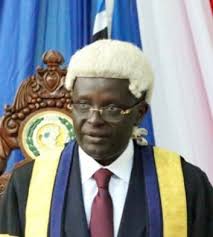KAMPALA: The First Instance Division of the East African Court of Justice is to deliver judgment on the election of Martin Ngoga in 2017 as the 4th Speaker of the East African Legislative Assembly (EALA) after the impeachment of his predecessor Margaret Ziwa.
The Judgment of Reference is No. 2 of 2018 where the Attorney General of the Republic of Burundi sued Ngoga. Fred Mukasa Mbidde, Uganda’s representative to EALA is the intervener
the Applicant is challenging the election of the 4th Speaker of EALA that took place on 19th December 2017 on grounds that, such election were made in the absence of any elected Member from the Republic of Burundi and the United Republic of Tanzania which is against the spirit and content of Articles 6(d), 7(2) and 57(1) of the EAC Treaty and Rule 12(1) of the Assembly’s Rules of Procedure.
The Applicant therefore seeks inter alia for declarations that; the Speaker of the 4th Assembly was elected in violation of Rule 12(1) of the Assembly Rules of Procedure and Articles 6(d), 7(2), 53(1) and 57(1) of the EAC Treaty; nullification of the said election; and an order for re-election of the Speaker of the 4th Assembly of EALA in accordance with EALA Rules of procedure, especially related to the rotation basis and quorum.
The Applicant submits that, Rule 12(1) of the EALA Assembly Rules of Procedure provides that; “the quorum of the House or of the Committee of the whole House shall be half of the elected Members and such quorum shall be composed of at least one third of the elected Members from each Partner State”.
That the provision on the number and composition of the elected Members constituting a quorum of the Assembly is mandatory, under the Assembly’s Rules of Procedure. This is evident by the use of the word “Shall” under Article 12(1) of the Assembly Rules of Procedure.
It is the Applicant submission that, the election of 4th Speaker of EALA without any elected Member from two EAC Partner States (the Republic of Burundi and the United Republic of Tanzania) is against the spirit and content of Articles 6(d), 7(2) and 57(1) of the EAC Treaty and Rule 12(1) of the Assembly’s Rules of Procedure.
Further that, violation of any Rule, especially related to the number and composition of the elected Members that shall constitute a quorum of the Assembly entails violation of the Treaty for the Establishment of the EAC, under which the rules are made. Such violation should be redressed by this Court, the only organ of the Community vested with jurisdiction of interpretation and application and compliance with the EAC Treaty as provided for under Article 23 and 27 of the Treaty.
The Applicant therefore seeks for redress that, this Honourable Court be pleased to declare that the Speaker of the 4th Assembly was elected in violation of Rule 12(1) of the Assembly Rules of Procedure and Articles 6(d), 7(2), 53(1) and 57(1) of the EAC Treaty.
Once the election of the Speaker of EALA is declared null and void, the consequence would be that the Court be pleased to order re-election of Speaker of the 4th Assembly of EALA to be conducted in accordance with EALA Rules of procedure, especially related to the rotation basis and quorum.
Ngoga in opposing the Reference argues that, he was elected in accordance with Article 53(1) of the Treaty and Rule 6 & 96(1) of the Rules of Procedure of the Assembly.
Ngoga argues that he was elected in an informal sitting which does not require quorum and strict adherence to the Rules of the Assembly. Further, he says, it is not true that members from the Republic of Burundi and the United Republic of Tanzania did not participate in the voting. The two Partner States were present in the precincts of the Assembly but decided to exercise their right to abstain from voting given that the right to vote includes a right to not to vote. Further argues that, Members from the two Partner States participated in the voting, to the extent that they nominated candidates to the position of the Speaker and who participated in the elections but lost.
He argues that the practise of walking out of the House with the view of paralysing the business of the Assembly and come around to claim that they were absent, yet they did not register any objection, and expect to benefit from such a behaviour should be condemned by all means at the disposal of the Court.
Ngoga further argues that, up to now at least the Members of the Assembly have accepted the Speaker and a lot of business is being transacted. Therefore it will not be very helpful at this point in time to nullify the disputed election of 19th December 2017 because once the election is nullified, then what will happen to business the House has conducted since the Speaker was elected, including Bills. The Respondent suggests that, for whatever reasons, if the Court disagrees with his arguments then the Court can opt to pursue prospective annulment which have been adopted in the Assembly.
He further submits that, the Applicant’s claim that the Secretary General of the EAC failed to advise as mandated by the Treaty is based on misinformation of the role of the Secretary General as an ex-officio Member of the Assembly. While in the Assembly, the Secretary General is under no obligation to guide on the conduct of any business of the Assembly arising from his ex-officio Membership. The Respondent pray that, the orders sought by the Applicant should be disallowed and the Reference dismissed.
The Intervener on his part opposes the main Reference and in support of the Respondent. Among other things the Intervener argues that, if the orders sought in the Reference to stay the recognition of the elected Speaker of the EALA are granted, such orders would affect the activities of the Assembly in that it would not be duly constituted without a Speaker. Further, the Assembly would thus not be able to proceed with its work and the East Africans would not be represented for the whole time that the Assembly’s work would be suspended.
Mukasa, the Intervener therefore supports the Respondent’s prayer and states that the prayers sought by the Applicant in the Reference should not be granted and the Reference should be dismissed with costs.
Procedure
The Reference was lodged with the EACJ First Instance Division on 17th January 2018 pursuant to Articles 6(d), 7(2), 27, 28, 53(1), 69 and 71(4) of the Treaty and Rule 2 of the EACJ Rules of Procedure, 2013 and Rules 6 and 12(1) of the EALA Rules of Procedure.
Composition of the Court
The Judgment will be delivered by Honourable Lady Justice Monica Mugenyi- Principal Judge, Honourable Justice Dr. Faustin Ntezilyayo- Deputy Principal Judge, Honourable Mr. Justice Fakihi Jundu, Honourable Justice Dr. Charles Nyawello and Honourable Mr. Justice Charles Nyachae.
Representatives of the Parties
Counsel for the Applicant: Mr. Nestor Kayobera
Counsel for the Respondent: 1st Respondent: Dr Anthony Kafumbe
Intervener: Mr Justin Semuyaba


